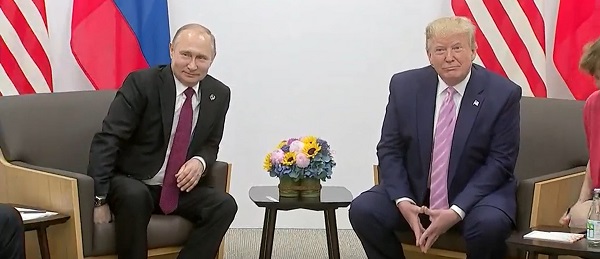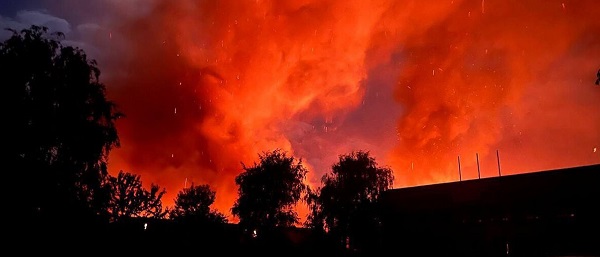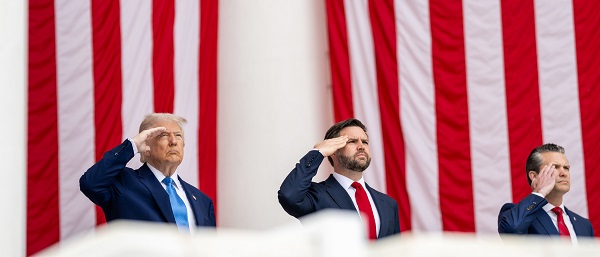conflict
Trump Brings Glimmer Of Hope For Peace In Europe


From the Daily Caller News Foundation
By Morgan Murphy
As the war in Ukraine rages onward, President-elect Donald Trump brings a glimmer of hope for peace in Europe this Christmas season.
An end to the fighting hinges on three key points: (1) Crimea (2) the Donbas region east of the Dnieper River and (3) NATO membership for Ukraine. Many more issues lurk, but without agreement on these major negotiating points, it is unlikely a peace deal will emerge.
Wars often begin with wild optimism that leads to untenable positions. In 1860, Confederates imagined a “short war,” and after early successes at Fort Sumter and Bull Run thought they would be marching through Philadelphia in a matter of months. In 1941, the Japanese strategized they could knock out the U.S. Pacific fleet, shocking and demoralizing the American public long enough for Japan to consolidate their “Greater East Asia Co-Prosperity Sphere,” capitalizing on resource-rich territories like Southeast Asia, the Dutch East Indies and the Philippines. In both cases, initial optimism led to eventual disaster.
In 2022, Russian President Vladimir Putin’s aimed to seize Kiev and roll over the rest of Ukraine. U.S. intelligence agencies predicted he would be successful. Similarly, after an unexpectedly strong defense, Ukrainian president Volodymyr Zelenskyy vowed to reclaim every inch of land occupied by Russia. Until as recently as this fall, he was touting a “victory plan” to force Moscow to surrender.
Yet, as it tends to do in conflict, the specter of death clarifies the mind. One thousand days of bloodshed in Eastern Europe has washed away initial optimism, giving way to grim realism on both sides. With the war approaching its third year, the biggest recent change in the dynamic is Trump’s landslide election in November.
In a word, Trump’s victory crushed any hopes that America might come charging into the war with air cover and boots on the ground. Out too, are further multi-billion “supplemental Ukraine spending packages.” The American people resoundingly voted to shrink government and cut off the firehose of taxpayer dollars spewing out of Washington, D.C.
Last Wednesday, Trump named Lt. Gen. Keith Kellogg as the special envoy to Russia and Ukraine. In the announcement, Trump said of Kellogg, “He was with me right from the beginning! Together, we will secure PEACE THROUGH STRENGTH, and Make America, and the World, SAFE AGAIN!” The battle-hardened warrior and former Fox News analyst (and full disclosure — my boss and colleague at the America First Policy Institute) will no doubt bring massive pressure to bear on both sides.
After the election, it did not take long for all parties to adjust to the new reality. Putin said what Trump publicly said “about the desire to restore relations with Russia, to help end the Ukrainian crisis, in my opinion, deserves attention at least.” Last week, Zelenskyy soberly admitted to Sky News that Ukraine would surrender Crimea, Russia’s critical entry point to the Black Sea.
“He’s been saying that quietly for more than a year,” another prominent Ukrainian politician told me privately this week.
Likewise, European leaders are quietly discussing the most likely scenario: Russia keeps Crimea and the Russian-centric provinces of Donetsk and Luhansk. Speaking off the record with several former Senate colleagues, the mood seems the same in Washington.
That leaves, of course, the issue of NATO membership for Ukraine. President Joe Biden and his senior-most cabinet membersr loudly and repeatedly promised NATO membership for Ukraine. The problem with that promise was their resounding defeat. The American people feel great sympathy for Ukraine, but that stops short of committing the lives of our youth to defend Ukraine’s borders.
Since at least 2007, Putin has made clear that NATO membership for Ukraine and Georgia are non-negotiable for Russia. Though many Western leaders seem to doubt his resolve, Putin has more than backed up his red line with 700,000 Russian casualties. More American jets or long-range missiles are unlikely to change Putin’s calculus.
Short of NATO membership, perhaps we will see a U.N. peacekeeping mission similar to the armistice on the Korean Peninsula in 1953. Ukrainian membership in the European Union may be in the offing as well.
Either way, a new American president and seeming willingness on both sides to negotiate brings with it the hope of peace in the new year.
Morgan Murphy is military thought leader, former press secretary to the Secretary of Defense and national security advisor in the U.S. Senate.
Artificial Intelligence
AI Drone ‘Swarms’ Unleashed On Ukraine Battlefields, Marking New Era Of Warfare


From the Daily Caller News Foundation
Artificial intelligence-powered drones are making their first appearances on the battlefield in the Russia-Ukraine war as warfare creeps closer to full automation.
In bombardments on Russian targets in the past year, Ukrainian drones acting in concert were able to independently determine where to strike without human input.
It’s the first battlefield use of AI “swarm” technology in a real-world environment, a senior Ukrainian official and Swarmer, the company who makes the software, told the Wall Street Journal in a Tuesday report. While drones have increasingly defined modern battlefields, swarms until now had been confined to testing rather than combat.
“You set the target and the drones do the rest,” Swarmer Chief Executive Serhii Kupriienko told the WSJ. “They work together, they adapt.”
So far, the Swarmer technology has been used hundreds of times to target Russia assets, but was first used a year ago to lay mines on the front, the Ukrainian official told the WSJ. The software has been tested with up to 25 drones at once, but is usually utilized with only three.
Kupriienko told the WSJ that he was preparing to test up to 100 drones at once with the linking software.
A common arrangement used on the battlefield includes one reconnaissance drone to scout out the target and two explosive drones delivering the payload on target, the official told the WSJ.
While Western nations such as the U.S., France and the United Kingdom are also pursuing drone swarm technology, they have not deployed swarm technology on the battlefield the way Ukraine has, according to the WSJ. Currently, autonomous weapons are not regulated by any international authority or binding agreement, but ethical concerns around the technology has led many to call for increased regulation of weapons like the Swarmer system.
The Ukrainian Ministry of Foreign Affairs did not immediately respond to the Daily Caller News Foundation’s request for comment.
conflict
Trump Pentagon Reportedly Blocking Ukraine From Firing Western Missiles Deep Into Russia


From the Daily Caller News Foundation
The Department of Defense has spent months blocking the Ukrainian military from using American and British-made missiles to hit targets deep inside Russia, The Wall Street Journal reported Sunday, citing unnamed U.S. officials.
Undersecretary of Defense for Policy Eldridge Colby reportedly designed the procedure to review requests to carry out the long-range strikes with weapons that are either of U.S. origin or that require American intelligence or use components provided by the U.S., according to the WSJ. Secretary of Defense Pete Hegseth reportedly has the final say on whether Ukrainian forces can use the MGM-140 ATACMS (Army Tactical Missile System) to hit targets in Russia.
The reported blocks on missile strikes coincides with a Trump administration effort to broker a peace deal between Russia and Ukraine. A Pentagon spokesperson declined to comment further on the matter.
BREAKING: President Vladimir Putin reacts to B-2 Flyover pic.twitter.com/1mzVn7DxlW
— Jack Poso 🇺🇸 (@JackPosobiec) August 15, 2025
The Biden administration allowed Ukraine to carry out strikes with ATACMS in November, weeks after President Donald Trump won the 2024 election, the New York Times reported. Trump criticized the move during a December interview with Time magazine.
“It’s crazy what’s taking place. It’s crazy,” Trump said. “I disagree very vehemently with sending missiles hundreds of miles into Russia. Why are we doing that? We’re just escalating this war and making it worse. That should not have been allowed to be done.”
Trump and Russian President Vladimir Putin met in Alaska on Aug. 15 for a summit meeting during which Trump sought to secure a cease-fire in Russia’s war with Ukraine. As Trump greeted Putin, a B-2A Spirit stealth bomber and several fighters carried out a flyover of Elmendorf Air Force Base.
Trump met with Ukrainian President Volodymyr Zelensky and major European leaders on Aug. 18 to update them on the summit.
In July, Trump reached an agreement with NATO where members of the alliance would purchase weapons, including MIM-104 Patriot surface-to-air missiles, and donate them to Ukraine.
-

 Crime22 hours ago
Crime22 hours ago‘Modern-Day Escobar’: U.S. Says Former Canadian Olympian Ran Cocaine Pipeline with Cartel Protection and a Corrupt Toronto Lawyer
-

 Business2 days ago
Business2 days agoNearly One-Quarter of Consumer-Goods Firms Preparing to Exit Canada, Industry CEO Warns Parliament
-

 Daily Caller1 day ago
Daily Caller1 day agoDemocrats Explicitly Tell Spy Agencies, Military To Disobey Trump
-

 Alberta2 days ago
Alberta2 days agoEdmonton and Red Deer to Host 2027 IIHF World Junior Hockey Championship
-

 Great Reset2 days ago
Great Reset2 days agoAre climate-obsessed elites losing their grip over global politics?
-

 Indigenous1 day ago
Indigenous1 day agoTop constitutional lawyer slams Indigenous land ruling as threat to Canadian property rights
-

 Alberta1 day ago
Alberta1 day agoAlberta on right path to better health care
-

 Daily Caller1 day ago
Daily Caller1 day agoALAN DERSHOWITZ: Can Trump Legally Send Troops Into Our Cities? The Answer Is ‘Wishy-Washy’



